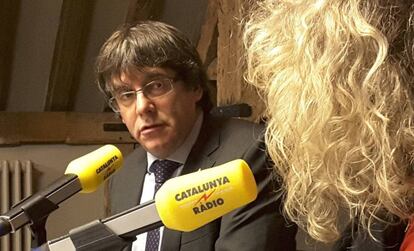Carles Puigdemont in Brussels: “We all know we can end up in jail”
Around 200 separatist mayors are traveling to Belgium today to “explain the situation in Catalonia”

A team from Catalunya Ràdio, a regional publicly funded radio network, traveled to Brussels on Tuesday to interview former premier Carles Puigdemont and the four ex-ministers who fled with him to Belgium last week to avoid legal action in Spain over their independence drive.
The interview is part of a new communications campaign launched by Catalan separatists to attract international support for their cause. “This is no longer a Spanish problem, this is an issue that interests media outlets from all over the world,” said Puigdemont.
On Monday, The Guardian ran an opinion column by Puigdemont denouncing “the mass imprisonment and criminalization of candidates” for the regional election scheduled for December 21. The election was called by Spanish Prime Minister Mariano Rajoy after his government invoked emergency powers in the wake of Catalan secessionists’ unconstitutional independence declaration of October 27.
The Constitutional Court is ultra-partisan, it has a single vision and it imposes it
Carles Puigdemont
The former premier said that he went to Brussels to “unmask the Spanish state.” Puigdemont and his aides failed to appear before a Spanish judge for questioning last week. They are wanted on charges including rebellion, sedition and misuse of public funds in connection with their secession push. The Audiencia Nacional, Spain’s High Court, issued a European arrest warrant for them, and all five turned themselves in to Belgian authorities on Sunday. They are due to appear in a Brussels court on November 17, and could be ultimately sent back to Spain, although Puigdemont’s Belgian lawyer has pledged to appeal such a move.
“We all know we could end up in jail if extradition is granted,” said Puigdemont. His former deputy Oriol Junqueras and eight other former cabinet members who showed up at the High Court last week are being held in pre-trial custody inside Madrid penitentiaries.
Speaking on the radio, the ousted premier denied that secessionists violated the Spanish Constitution with their self-made breakaway laws and October 1 referendum, and said that he and his colleagues are being persecuted for their ideas.
It is false that we have ignored the Constitution
Carles Puigdemont
“It is false that we have ignored the Constitution... because there are international treaties that contemplate the right to self-determination, and constitutions are favorable to interpretation under international law,” he said, alluding to the United Nations resolution 50/6, which only acknowledges this right for people “under colonial or other forms of alien domination or foreign occupation.”
Puigdemont described his own ousted Catalan government as perfectly legitimized to do what it has done. “On September 26, 2015, in a historic vote, Catalans elected the most legitimate parliament in history […] and that is why we are the legitimate government of Catalonia.”
At that election, the separatist Junts pel Sí coalition won 62 seats in the 135-seat assembly, short of a majority. Forced to seek alliances for legislative support, it turned to the small far-left CUP party, which is a strong advocate of immediate secession from Spain and anti-capitalist economic policies. Together these groups represent 48% of the votes that were cast on election day.
On Tuesday, Puigdemont also said that Spain’s Constitutional Court is “ultrapartisan, it has a single vision and it imposes it.” This court recently struck down the Catalan breakaway laws and the October 1 referendum. Earlier, it had also outlawed a non-binding referendum held in November 2014. And before that, in 2010, the court ruled that parts of the Catalan Statute of Autonomy – the regional charter of rights – were unconstitutional, a move that triggered widespread protests in Catalonia at the time.
Mayors in Brussels
Around 200 separatist mayors are due to arrive in Brussels on Tuesday to “provide a first-hand account of the situation” in Catalonia. Ciudadanos, a Spanish party whose genesis was as a Catalan unionist group – its Catalan branch is currently the second most-voted force in the regional parliament – said that the separatists had requested to speak inside the European Parliament, but that their petition has been denied.
English version by Susana Urra.
Tu suscripción se está usando en otro dispositivo
¿Quieres añadir otro usuario a tu suscripción?
Si continúas leyendo en este dispositivo, no se podrá leer en el otro.
FlechaTu suscripción se está usando en otro dispositivo y solo puedes acceder a EL PAÍS desde un dispositivo a la vez.
Si quieres compartir tu cuenta, cambia tu suscripción a la modalidad Premium, así podrás añadir otro usuario. Cada uno accederá con su propia cuenta de email, lo que os permitirá personalizar vuestra experiencia en EL PAÍS.
¿Tienes una suscripción de empresa? Accede aquí para contratar más cuentas.
En el caso de no saber quién está usando tu cuenta, te recomendamos cambiar tu contraseña aquí.
Si decides continuar compartiendo tu cuenta, este mensaje se mostrará en tu dispositivo y en el de la otra persona que está usando tu cuenta de forma indefinida, afectando a tu experiencia de lectura. Puedes consultar aquí los términos y condiciones de la suscripción digital.








































